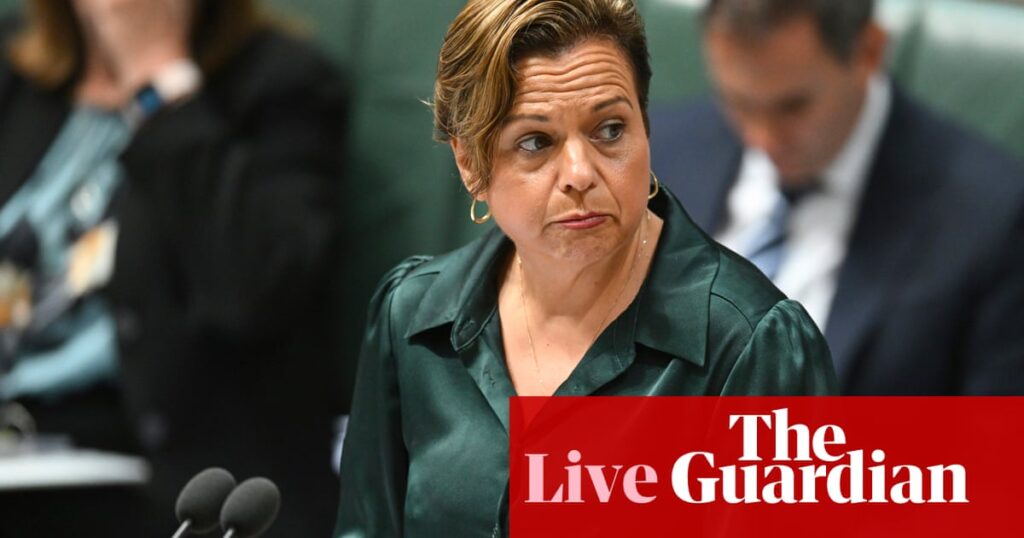Under-16s social media ban to include penalties for social media companies up to $50m

Josh Butler
The controversial ban on social media for under-16s will be introduced into parliament today and will be accompanied by a proposal to massively increase fines on social media companies which breach the legislation – up to $50m.
The office of the communications minister, Michelle Rowland, sprinkled out some sparing details of the legislation overnight. Rowland said in some provided remarks:
This reform is about protecting young people and letting parents know we’ve got their backs. The legislation places the onus on social media platforms, not parents or children, to ensure protections are in place.
The government might try to push this through before parliament rises at the end of next week, with the support of the opposition leader, Peter Dutton, who wants it passed before Christmas. But Nationals senator Matt Canavan said yesterday the bill should get a proper Senate committee process and not be rushed through.
We understand the legislation will require regulated companies to take “reasonable steps” to prevent young people from having a social media account. What’s a regulated entity, you might ask? Well the minister will also get the power to exclude specific classes of services from those rules too, which could include messaging services, online games and services for health or education.
Tech companies will also be subject to privacy provisions, including obligations to protect and destroy any data they collect.
The government had flagged plans to boost penalties available under existing legislation, saying the current rules didn’t do enough to force big tech to take notice. We understand the new legislation will increase penalties up to $50m for systematic breaches of the rules.
Not mentioned overnight, but what we’ll be eagerly anticipating details on, is how the government thinks tech companies can enforce those rules, and how they will apply to all Australians. Communications department officials have already told Senate estimates that essentially all Australians will have to undergo some kind of age assurance or verification, in order to make sure those under 16 aren’t on those platforms – but the government hasn’t been forthcoming on that issue yet.
We’re also interested to know what data will have to be provided to tech companies, and how they’ll keep it safe.
Key events
Daniel urges government to enact ban on gambling ads
Zoe Daniel was asked if the government has given her any indication we will see gambling reform? The independent said: “I have absolutely no idea”.
I ask all the time. ‘It’s coming, we’re working on it, we’re doing our due diligence, we’re trying to do it properly.’
My community wants a gambling advertising ban in its entirety. That’s very simple, and all the surveys show that roughly three quarters of Australians want that.
She argued a complete ban on gambling ads would “play very well in the electorate” and urged the government to “stop worrying” about the broadcasters and the sporting codes, and “think about communities”.
Daniel says under-16s ban on social media not right ‘pathway to go down’
On the government’s push to ban under 16s from social media, Zoe Daniel said she doesn’t love the idea and believes it is “on the fringe of what we need to be doing”.
My biggest concern about it, really is that it doesn’t substantively change what the platforms need to be doing on their platforms, and there may be an unintended consequence that the platforms actually become less safe …
If you were to create a system where the platforms have to take responsibility, mitigate risk and be transparent about how they’re doing that and what tools they’re using, then that sort of provides – potentially – an environment where everyone can be in a safe space. What we’re doing is saying, ‘Well, we’re going to lock everyone under 16 out, and then everyone else can do whatever they want in there.’ And also, we know that some people under 16 will get in. I don’t think that that’s really a good pathway to go down.
Crossbencher concedes electoral reform likely to pass Senate
Independent MP for Goldstein, Zoe Daniel, is also speaking with ABC RN this morning – first up, on the government’s proposed electoral reforms.
She’s repeated criticism the crossbench has been making in recent days – that it doesn’t keep big money out of politics and entrenches the power of the major parties, and incumbency.
Daniel said she accepts this will likely pass the Senate, and she believes this is “not only incredibly inappropriate, but really disrespectful to democracy to do that.”
Asked if she believes the Liberals are more concerned about independents than Labor, she responded:
Look, maybe, but I think, to be honest, it’s a little bit like the game of Whack a Mole … just put a hammer down on anything that’s going to threaten you.
And look, it’s self evident that the most recent independents took blue ribbon Liberal seats, but at the end of the day, Labor’s in government, and so I think it demonstrates a level of concern from the ALP as well about fragmentation of the two party system.
Bill Shorten says cap on international students ‘makes sense’
Asked if he agrees with the proposed cap on international students, Bill Shorten said he does.
I think that makes sense … The other thing is that … higher education policy is something which I’ll work on when I’m in higher education, and when I go and work at the University of Canberra I absolutely must make clear to people, including my colleagues, I’ll be working for the university, not for the government. That’s the team I’ll be backing then.
Shorten was also asked if international students have been scapegoated for the housing crisis? He responded:
I think you find that international students put some pressure, in some parts, on rental markets. We also do need international students. It’s an important export industry. I think what the Liberals should have done is sit down with Labor and just worked it through it. But instead, in the shadow of an election where they can sniff the fumes of conflict, they’ve decided to … just oppose.
Bill Shorten says society ‘fracturing’ when asked about Labor disconnect with working class
Bill Shorten was asked about an apparent disconnect between the Labor party and working-class voters, and a trend that people who earn more are voting Labor – does that concern him? He responded:
You always want more people voting for you, so if people aren’t voting for you, that’s always a focus. But the way you get people to vote for is you focus on them, not yourself. I think there’s [disillusionment] with the major parties but there is … a range of factors for that.
He said part of this was where people chose to get their information from, and said:
I think we’re seeing, in parts, the fracturing of society into silos, into people who talk to people who agree with them and yell at everyone else.
Bill Shorten to deliver valedictory speech today
The NDIS minister and former Labor leader, Bill Shorten, is set to deliver his valedictory speech to parliament today, before he leaves politics to take up the role of vice-chancellor at the University of Canberra next year.
He said his speech would include a lot of thank yous, and reflections on the “privilege” to serve in three public institutions: the Australian Workers’ Union, Labor party and the parliament itself.
I’m excited, though I have mixed feelings about going. I love my job [and my] portfolios, working with people with disability and [working with] people [who] need Centrelink and Medicare and child support, but I’m excited about moving to education.
Asked if it was a deliberate decision to move into the public sector rather than the private sphere, he said it was:
I don’t want to be a lobbyist … There’s completely nothing wrong with politicians going to work in the private sphere, the private economy is what generates Australian economic growth. For myself, I like serving people. I want to help people, and I think I’m going to want to do that for the rest of my life.
New South Wales MPs condemned for ‘part-time’ parliamentary year
Scores of NSW MPs will earn the equivalent of more than $10,000 per sitting week in 2025 after a bid to increase the year’s 16-week calendar was rejected, AAP reports.
The Labor government’s lower house schedule for MPs earning $172,500 a year is several weeks short of the recent average, barring years affected by state elections or Covid-19. An opposition bid to add two extra weeks was rejected this week after Labor cited restrictions imposed by upper house events.
The change would have done away with six Friday sittings, which have been criticised for having no question time and depriving regional MPs of a weekday in their electorate with voters. The government’s leader in the lower house, Ron Hoenig, said holding Friday sessions in six of the 16 weeks allowed it more time to pass legislation and offered crossbenchers dedicated time to advocate for their electorates.
But Helen Dalton, independent MP for the rural electorate of Murray, said the minority Minns government needed to learn to “listen to, and work with the crossbench and even the opposition”.
To do this, government MPs have to turn up to parliament and discuss matters. Voters won’t be happy that government MPs would prefer to hide in their electorate offices rather than turning up to parliament, where they face scrutiny.
The 16-week schedule also prompted the Speaker, Greg Piper, to deliver a rare rebuke to the government, saying efforts to meet more often had met opposition from upper house Labor chiefs. He said 20 to 21 sitting weeks a year – as occurred many times in the past decade – seemed more in line with community expectations.
The opposition said allowing only 48 days with question time was “an absolute affront to democracy”. The lower house leader of opposition business, Alister Henskens, said Friday sitting days were “a complete and utter waste of time if they do not have question time”. But the bid to add two extra weeks, and six extra question time days, to the calendar was knocked back 51 to 36 votes.
Wells says Future Fund changes will give business more certainty
Anika Wells was also asked about changes to Australia’s Future Fund. As Paul Karp reported overnight, the $230bn sovereign wealth fund will be retooled to help build houses, improve infrastructure and combat global heating under a new investment mandate.
Wells said the business sector is looking for more certainty and “this is one way that we can give it to them”.
We parliamentarians go to an election every three years to seek a mandate from the people and I think there’s no dispute that the priorities that people want from its federal government at the moment are … to do with the housing crisis … more certainty about our energy future and better infrastructure, and setting us up for a good future ahead. So I don’t think those tenets are controversial whatsoever.
What if it doesn’t actually return the funds that we need it to? Wells responded that there are “safeguards in there about this being a medium term … forecast”.
This is just saying if there’s stocks you can invest in, or if there’s a renewable energy or housing project you can invest in, pick the one with the public interest.
Wells says $50m fine for social media companies ‘not silver bullet’ but will help
The sports minister, Anika Wells, spoke with the Today show earlier, where she touted the government’s proposed social media ban for under-16s – specifically, a move to fine social media companies which breach the legislation up to $50m.
Josh Butler had all the details on this earlier in the blog, here.
Wells told the program that this issue of social media a “serious problem” and parents are “really worried about it.”
They want their federal government to be pulling all of the levers available to them to try and address this issue. Is it a silver bullet? Of course not. Is this going to cure everything? No, probably not, but it is something that’s going to help and I think, for one, it’s a pretty big stick to be wielding for there to be $50m penalties for social media platforms doing the wrong thing.
Full Story podcast: A look at the Kyle and Jackie O Show
Kyle Sandilands and Jackie O Henderson have dominated the breakfast slot in Sydney for almost two decades. But the show’s recent expansion into the Melbourne market has tanked.
And while they have a reputation for crude language and stunts, the conversations that are broadcast continue to raise questions about how the show skirts decency standards.
In today’s Full Story podcast, our senior correspondent Sarah Martin and reporter Kate Lyons tell Nour Haydar how Australia’s highest-rating radio program gets around broadcast regulations:
And in the second part of our special report on Kyle and Jackie O, we ask why they bombed in Melbourne. Is it because, perhaps, that Sydney sensibility is just a bit crass for Melbourne? Here’s our story:
Does Sky News documentary on ‘Real Cost of Net Zero’ stack up?
Trailed extensively in ad breaks and spruiked in the News Corp papers, a Sky News documentary this week purported to reveal “The Real Cost of Net Zero”.
Presented by former ABC political editor Chris Uhlmann, the thrust of the show was that “weather-dependent electricity generation” had been found wanting and was pushing up prices for consumers.
But do the claims stack up? In this week’s Temperature Check column, Graham Readfearn kicks the proverbial tyres. Read his piece here:
Australia is largest provider of financial aid to Pacific, Lowy Institute says

Sarah Basford Canales
Australia remains the largest provider of financial development assistance to the Indo-Pacific region by far but China has re-emerged in second-place with a “more competitive, politically targeted model of aid engagement”, a new aid report shows.
The Lowy Institute’s 2024 Pacific Aid Map (view here) shows aid to the region dropped by 18%, according to 2022 figures, mostly owing to discontinuing Covid-19 support, and compounded by cuts to global aid budgets and resources diverted to Russia’s war against Ukraine.
The figures also show infrastructure financing rose by 67% in 2022, while human development funding fell compared with the previous year.
Australia committed $2.2bn to the region in assistance over the year with $1.5bn of it going to Papua New Guinea and $116m to the Solomon Islands. While the US committed $311m in the period and China committed $262m, the countries spent $249m and $256m respectively.
Australia is driving a significant portion of regional infrastructure with commitments increasing by 60% in 2022 alone.
Looking at China, the report said Beijing had changed its tack following a “pandemic lull” and was now offering more grants and community-level outreach compared with its larger infrastructure financing projects. China has also increased its annual spending in certain countries, such as Kiribati and the Solomon Islands, while decreasing funding to PNG, Fiji and Samoa. The report noted:
Pressures on both donor and Pacific government budgets are likely to grow, meaning more will need to be done with less to secure critical development wins. The allocation of development budgets from the region’s major donors also appears increasingly shaped by geopolitical concerns, raising questions about the trade-offs and sustainability of the current course.
Good morning

Emily Wind
And happy Thursday – thanks to Martin for kicking things off. I’m Emily Wind, and I’ll be taking you through our live political coverage for most of today.
You’ll have the whole Canberra team bringing you updates – Karen Middleton, Josh Butler, Paul Karp and Sarah Basford Canales, as well as Mike Bowers capturing all the action.
You can get in touch with any tips via email, emily.wind@theguardian.com.
Let’s get started.
Woolworths workers on stike

Jonathan Barrett
More than 1,500 employees across four Woolworths distribution centres have started an indefinite strike as worker representatives seek a “cost-of-living wage increase” and improved conditions.
The industrial action, which starts today, affects three warehouses in Victoria and one in New South Wales, and threatens to disrupt logistics before the busy Christmas shopping period.
The workers are seeking equal pay across distribution centres, bringing entry-level rates to at least $38 an hour. They also want to dismantle an efficiency system that warehouse staff have described as “bullying” and unsafe.
The national secretary of the United Workers Union, Tim Kennedy, said:
Woolworths are squeezing shoppers at the register and workers on pay and conditions, while making ever increasing profits. This is contributing to growing wealth inequality in Australia.
No one wants to see bare supermarket shelves in the lead up to Christmas. Woolworths can fix this by coming back to the table and negotiating a fair agreement.
A spokesperson for Woolworths’ supply chain Primary Connect said in a statement the company did not expect an immediate impact to stores in Victoria and NSW, while stores in other states would not be affected.
We have already put forward several offers with competitive pay that is above industry standards, above local market rates, and well above the award.
Under-16s social media ban to include penalties for social media companies up to $50m

Josh Butler
The controversial ban on social media for under-16s will be introduced into parliament today and will be accompanied by a proposal to massively increase fines on social media companies which breach the legislation – up to $50m.
The office of the communications minister, Michelle Rowland, sprinkled out some sparing details of the legislation overnight. Rowland said in some provided remarks:
This reform is about protecting young people and letting parents know we’ve got their backs. The legislation places the onus on social media platforms, not parents or children, to ensure protections are in place.
The government might try to push this through before parliament rises at the end of next week, with the support of the opposition leader, Peter Dutton, who wants it passed before Christmas. But Nationals senator Matt Canavan said yesterday the bill should get a proper Senate committee process and not be rushed through.
We understand the legislation will require regulated companies to take “reasonable steps” to prevent young people from having a social media account. What’s a regulated entity, you might ask? Well the minister will also get the power to exclude specific classes of services from those rules too, which could include messaging services, online games and services for health or education.
Tech companies will also be subject to privacy provisions, including obligations to protect and destroy any data they collect.
The government had flagged plans to boost penalties available under existing legislation, saying the current rules didn’t do enough to force big tech to take notice. We understand the new legislation will increase penalties up to $50m for systematic breaches of the rules.
Not mentioned overnight, but what we’ll be eagerly anticipating details on, is how the government thinks tech companies can enforce those rules, and how they will apply to all Australians. Communications department officials have already told Senate estimates that essentially all Australians will have to undergo some kind of age assurance or verification, in order to make sure those under 16 aren’t on those platforms – but the government hasn’t been forthcoming on that issue yet.
We’re also interested to know what data will have to be provided to tech companies, and how they’ll keep it safe.
Welcome
Good morning and welcome to our live politics blog. This is Martin Farrer, bringing you the top overnight stories and then it will be Emily Wind in the hot seat.
The office of the communications minister, Michelle Rowland, has released some details overnight of the social media ban legislation that she will introduce to parliament today. The controversial ban will be backed by fines for social media companies which breach the legislation – up to $50m. “This reform is about protecting young people and letting parents know we’ve got their backs,” Rowland said. More coming up.
After it emerged yesterday that “Colesworth” was the ANU’s word of the year, describing the cost-of-living crisis, it is the turn today of Coles to front the consumer watchdog’s inquiry into supermarkets. We will be following developments as they happen. It comes as the other half of the portmanteau, Woolworths, will be hit by 1,500 workers going on an “indefinite” strike for more pay. More on that soon.
One of our top stories this morning reveals how hundreds of university executives are raking in more money than state premiers, a new report reveals, pointing to a “governance crisis” threatening the sector. In New South Wales, 89 executives earn more than Chris Minns’s $416,440 salary while in Victoria 62 make more than Jacinta Allan’s $481,190.



